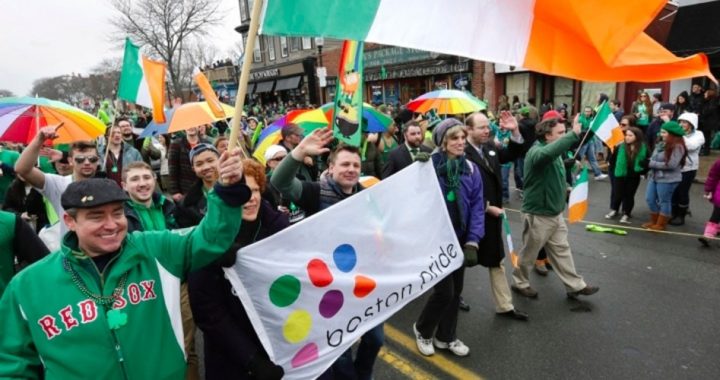
This year’s St. Patrick’s Day Parade in Boston went on as “unusual” Sunday, with avowedly homosexual groups coming in, the state’s Knights of Columbus dropping out, city and state political figures celebrating the event’s new “inclusiveness,” and the leader of a conservative Catholic organization calling on parade organizers to remove Saint Patrick’s name from the event.
Other than that it was a typical St. Patrick’s Day Parade.
Crowds lined the city streets to watch the event, which was shortened due to huge snow banks at curbside along portions of the usual route. Police reported 10 arrests and 278 citations, most of them for public drinking, according to media reports. The light, cold rain that fell on the marchers and spectators bore little resemblance to the verbal storm over the South Boston Allied War Veteran Council’s decision to include two “gay” and lesbian groups — OutVets and Boston Pride — in the line of march. For the first time in the 114-year history of the event, groups celebrating homosexuality were included in a parade ostensibly honoring a Catholic saint.
On Saturday, the Catholic Action League of Massachusetts (CALM) issued a statement calling on parade organizers to remove the name of Ireland’s patron saint from the event. “The saint’s venerable name should not be cheaply misappropriated by nominally Catholic politicians and anti-Catholic organizations with a same-sex agenda,” wrote CALM Executive Director C.J. Doyle, charging that the event would “debase the name of Saint Patrick by associating it with the tawdry circus that will take place on Broadway tomorrow.”
CALM and the conservative group Mass Resistance both denounced the Massachusetts Knights of Columbus for its planned participation in the parade before the Knights announced late last week their decision to drop out. In a message on its website, the well known Catholic fraternity organization said it had believed the parade would be an occasion for “unity and celebration in the city of Boston,” adding:
We deeply regret that some have decided to use this occasion to further the narrow objectives of certain special interests, which has subjected this occasion to undeserved division and controversy. In addition, certain groups have chosen to misrepresent our reason for marching, insisting that we were participating in the parade to support another group or for political reasons. Such allegations are complete fabrications and have no basis in reality whatsoever.
Mass Resistance issued a statement crediting “intense pressure from traditional Catholics” for the Knights’ reversal. The Knights of Columbus “had not been in the parade for at least 20 years,” the group said, suggesting that the plan to participate this year was to show approval of the new “inclusiveness.”
Many of the state’s leading political figures had made a point of staying away from the parade during more the than two decades of controversy over the exclusion of homosexual organizations. In the early 1990s a group called the Gay, Lesbian and Bisexuals of Boston took the issue to court, claiming the event, with up to 20,000 marchers and as many as a million spectators on the streets of Boston, is a public accommodation and their exclusion was a violation of the state’s anti-discrimination laws. The legal battle went all the way to the U.S. Supreme Court, where a 9-0 ruling in 1995 held that forcing the parade’s organizers to include groups with themes contrary to their own would violate of “expressive freedom” protected by the First Amendment.
Elected officials have nonetheless boycotted the event in the years since, with some choosing instead to take part in the Gay Pride Parade held in Boston each June. Boston Beer Company’s Sam Adams withdrew its sponsorship of the St. Patrick’s Day Parade last year. Mayor Martin Walsh, who has marched in the Gay Pride Parade both as candidate and as mayor, became the first Boston mayor in 20 years to join the city’s Saint Patrick’s Day event when he marched in Sunday’s parade. Both last year and this, Walsh reportedly lobbied hard with the parade’s organizers to get “gay” groups in.
“I’m very happy,” Walsh said just before marching. “We can finally move beyond the issue of inclusiveness.” Governor Charlie Baker, Lieutenant Governor Karyn Polito, U.S. Senator Edward Markey, and U.S. Representative Stephen Lynch, a South Boston native, were among the other political figures in the parade, the Boston Globe reported. U.S. Representative Seth Moulton, a Marine veteran of the Iraq War, marched with the OutVets. “Gay rights is the civil rights fight of our generation,” Moulton said. Members of the Boston City Council also took part in the festivities. Police Commissioner William Evans, also a South Boston native, told the Globe the parade always makes it a good day, adding, “It’s great that it’s now inclusive.”
For some people and organizations, however, living by a moral code is as much a matter of excluding as it is of including certain causes and events. The Immaculate Heart of Mary School in Harvard, Massachusetts, which has sent a float and a 40-member band to the parade for past 25 years, this year announced it would not be joining in the festivities.
“We don’t want to be seen as condoning homosexual activity and gay marriage,” said the school’s principal, Brother Thomas Dalton.
Few among the state’s political leaders, including its many Catholics, appear hindered by such scruples.
Photo of St. Patrick’s Day Parade in Boston: AP Images



